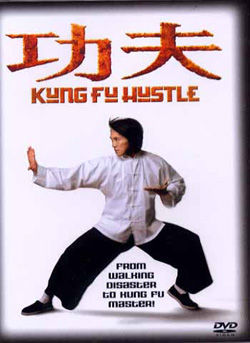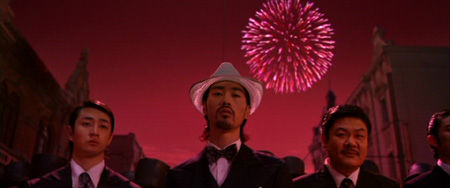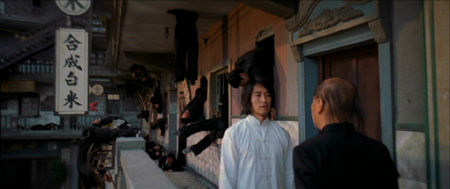Ian Stanley reviews
Sony Pictures Home Entertainment/ERA
- Cert: IIB
- Cat No.: 36423MNWS
- Running time: 99 minutes
- Year: 2004
- Pressing: 2005
- Region(s): 3, NTSC
- Chapters: 28
- Sound: Dolby Digital 5.1, DTS 5.1
- Languages: Cantonese, Mandarin
- Subtitles: English, Chinese
- Widescreen: 2.40:1
- 16:9-Enhanced: Yes
- Macrovision: No
- Disc Format: DVD 9
- Price: £9.99
- Extras: Theatrical Trailers
Director:
- Stephen Chow

Cast:
- Sing: Stephen Chow
Brother Sum: Chan Gwok-kwen
Sing’s Sidekick: Lam Ji-chung
Landlady: Yuen Qui
Landlord: Yuen Wah
Coolie: Xing Yu
Donut: Dong Zi-hua
Tailor: Chiu Chi-ling
Since the Hong Kong release of Shaolin Soccer in July 2001, Asian film fans have long been waiting for Stephen Chows follow-up project.
After the critically lauded film hit big over Asia (it broke Hong Kong box-office records), the rumours started circulating that his next film would naturally be the sequel. These rumours were duly scotched, however others rose in their place that Chow’s next film would actually be a sequel to an earlier film of his called God of Cookery. Neither of these turned out to be true as he chose to make his next film a completely original story!
Kung Fu Hustle has long been in production and the process (if you believe the rumours) was far from smooth, with admissions of script problems, casting problems and punishingly hot filming conditions. Added to which, (alleged) on-set tensions between the reportedly perfectionist Chow and fight choreographer Sammo Hung (Eastern Condors, Pedicab Driver) led to Hung leaving the film nigh on two months into production. Fortunately though, in somewhat of a coup for the film, they subsequently managed to secure the services of genius choreographer (and fellow perfectionist) Yuen Wo-Ping to pick up where Hung left off. The results of a such troubled shoots usually fall into one of two categories, so this was either going to be a brilliant realisation of Co-Writer/Producer/Director/Star Chow’s singular vision, or, a mightily muddled mess (alliteration not intentional).
Set in the 1940’s the movie details the story of Sing (Stephen Chow, King of Comedy), a small-time scoundrel who has visions of joining the Axe Gang, a murderous Organized Crime mob who have taken over an un-named city in China (most probably representing Canton, Shanghai). One of the only places that they have yet to take over in the city is the down at heel apartment complex called Pig-Sty Alley.
Sing and his partner-in-crime, pretending to be members of the Axe Gang, try to extort money from the inhabitants and in doing so, bring the actual Axe Gang into conflict with them. The inhabitants, however, aren’t as helpless as they first appear, some of them just happen to be kung fu masters, and when they fight back they set into motion a chain of escalating conflict. In the midst of all this Sing finds that he must pick a side in the conflict, does he continue with his dream of joining the Axe Gang or does he side with the underdog Inhabitants of Pig-Sty Alley.

Thus, yet another factory went boom!
It never ceases to amaze me, how I can write a story synopsis for a comedy movie and make it sound about as funny as death. Trust me though, this film IS funny and also unique to boot. It’s very easy to believe that ‘Kung Fu Hustle’ is the product of an auteur, rather than movie making by committee. After a surprisingly violent opening scene it segues into a montage that contrasts the Axe Gang’s rise to power with a synchronised dance scene, containing the gang, that leaves you grinning from ear to ear (I’m sure Chow included this as a similar scene was left out of the Hong Kong theatrical cut of Shaolin Soccer.).
From there the film just exudes its own crazy energy and bounces wildly back and forth from Kung-Fu fights to comedy skits to film references and then to a chase scene that is probably as close to a live action road-runner cartoon as you’re ever likely to get (until such a beast hits the screen). This breathless energy and sense of fun are probably the things that stop me from making the (not exactly invalid) criticism that Kung Fu Hustle is somewhat scattershot and unfocussed.
Director Chow and cinematographer Poon Hang-sang turn in an absolutely beautiful movie that really does benefit from a larger than normal budget for an Asian production (from what I gather it stands at just upwards of US$30m). Chows use of the camera and eye for shot composition both seem to be improving from film to film and he turns in here his best looking movie to date, making great use of the 2:40:1 aspect ratio. The camera work is smooth and elegant, and the two main sets are beautifully realised, contrasting nicely the opulence of the big city with the poverty of Pig-Sty Alley.
I think that one of the major selling points in the West, where Stephen Chow is not so well known, will be Yuen Wo-pings fight choreography which is, once again, breath-taking. In this film, however, he adds more of a slapstick feel to some of the scenes that might come as somewhat of a shock to those that only know his more straight-faced work from Kill Bill and the Matrix movies.
As an example of this, in Chows big fight scene one of his signature moves is that he stamps on the feet of his opponents and squashes them flat, I mean really flat, like a Tom & Jerry cartoon. This contrasts oddly with the very real looking screams of pain on the faces of the afflicted henchmen, but then again, Asian movies (especially some of Chows) can be somewhat tonally uneven. The violence in this movie, whilst occasionally very brutal, is for the most part bloodless and comical.
Much like the Matrix movies, the fantastical elements to the story means that the fight scenes are based heavily around wirework, CGI, and people defying the laws of gravity, this sometimes comes at the expense of more intricate moves. However the fights are for the most part inventive and each has their own particular style, my favourite would most likely be the first fight in Pig Sty Alley which is the one that is most grounded (in every sense of the word) and based in reality.
As with Shaolin Soccer, whilst the movie is undeniably fun it is not by any means perfect. Whilst Chow appears to be stylistically making progress with each film, script wise this does seem to be somewhat of a step backwards. Whilst it is more serious in tone than Soccer, that film actually seemed like a proper movie, this sometimes seems like the more serious moments are there to join the comedy skits, and some of these skits seem somewhat out of place and merely there to bump up the running time.
To take two examples from the film, there is a nice sketch close to the beginning of the movie where Sing tries to come off as a gangster, in front of the villagers, by offering to fight weak looking people. Through a series of clever sight gags these people turn out to be rather more opposing foes than they at first appear. Now this sketch works both by being genuinely funny and also establishing to the viewer that Sing is, in fact, a coward. A second skit, later in the movie, involves an extended scene in which a character has their hair accidentally set on fire whilst their companion struggles vainly to put it out. This scene, in comparison to the other, goes on for far too long and is completely redundant plot wise.
Also somewhat redundant is a slight romance between Sing and an ice-cream vendor (played by newcomer Huang Sheng-yi) that, whilst sweet, feels rather forced and shoe horned in out of convention.
On a technical level it would also be fair to say that whilst the CGI is of a generally strong level some of it is a bit on the ropey side, but no more so than The Matrix Reloaded‘s Burley Brawl. In common with that movie, in-fight CGI is quite often used to present moves that would be impossible to pull off practically, but they just dont quite have the physics nor the fluidity of human movement (or budget) down yet, and some such moments just come off as looking weightless and obviously fake.
Once again, Chow plays the affable underdog who comes good by the end of the movie. Whilst Sing does have a slight bit more of an edge than usual he’s not significantly different to the type of character that Chow usually plays. Truth be told, as well as he does here it would be nice to see Chow try something different sometime. Whilst it’s fair to say that Chow probably gets the biggest share of the screen time, in this movie, much like in Shaolin Soccer before it, he lets the supporting cast have their moment in the sun. Unfortunately, this leads to another one of the movies problems.
As the central character, Sing is almost completely passive in the furthering of Kung Fu Hustles story. Whilst his actions actually do upset the status quo in the films world, and therefore brings about the conflict, the escalations it then takes mostly come about without any further input from him. Sing essentially takes a reactive backseat until the third act. Whats even worse is that the unleashing of his latent Kung Fu abilities is brought about through pure happenstance, thereby even robbing Sing of the chance to earn this turnaround in fortune. Ultimately we come to root for the guy not because hes really earned a happy ending but because we know that hes really just a good-hearted chap.
The strong supporting cast contains a fair few familiar faces from Shaolin Soccer and some of Chow’s other previous movies. Amongst these we have Lam Ji-chung, Chan Gwok-kwen, Tin Kai-man and also a nice cameo from Fung Min-hun. All of them do well here and really look as if theyre enjoying themselves greatly. Also worthy of note are Xing Yu, Dong Zi-hua and Chiu Chi-ling who play three of the Alleys kung fu masters. One of the biggest surprises of the cast, however, is not so much who’s present but actually who’s notable by their absence.
Kung Fu Hustle marks the first Stephen Chow directed movie, of recent memory, without Ng Man-Tat in it. The man has virtually been Chow’s (movie) shadow for the last decade or so and his non-appearance in this is a bit of a mystery.
I feel I have to make a special mention here of Yuen Qui who, as Pig Sty Alley’s remarkably loud-mouthed Landlady, almost steals the movie from under Chow’s nose. Her metamorphosis from abusive, chain-smoking harridan into one of the defenders of Pig-Sty Alley is remarkable, and her impromptu nod to Bruce Lee (circa Way of the Dragon) is one of the movie’s best moments and biggest laughs. Also of note is Yuen Wah who, as her husband, also goes through the same character arc, and the pair work very well together as a nice comic duo.
All in all, whilst Kung Fu Hustle is far from perfect, it is still a wildly enjoyable affair that manages to deflect many valid criticisms by sheer virtue of its energy, pace, good nature and the fact that its very, very funny in places. The movie features strong visuals, solid production values and is well played by a decent cast. Highly recommended.

“No, seriously, how could you tell Fred West built this place?”
Whilst distributed by a company called ERA, it is, in truth, a Columbia/Tristar DVD, with all the technical expertise that pertains to that fact. As such it contains an excellent picture that it presented at the 2:40:1 aspect ratio and is 16×9 enhanced. I can really find little to fault, there is a satisfying level of detail on display, faithful skin tones, vibrant colours and deep, rich blacks. There was no print damage and nary an example of intrusive edge-enhancement to be found. If I had to be overly critical I would perhaps point out a minor amount of aliassing and that the picture is, perhaps, a tad soft for my tastes. Really though, it is a solid video transfer and I doubt the eventual R1 release will look any better (My betting is that theyll use this same transfer).
There are 3 soundtracks on the disc, you get the original Cantonese track in both Dolby Digital 5.1 and DTS and you also get a Mandarin dub in Dolby Digital 5.1. For the purposes of this review I primarily listened to the DTS track and am pleased to report that its a corker. Its a loud and enveloping mix that makes aggressive use of the subwoofer and the surrounds at every available opportunity. The effects placement and panning are absolutely superb, hearing the fights and the landladys shrill cries echo around the room really draws you into the movie. I also briefly checked out the Cantonese Dolby 5.1 track and, whilst it was still pretty good, it seemed positively subdued by comparison, with greatly reduced bass. If you have the choice, go DTS for this one and crank it up loud, your neighbours will probably hate you for it but youll have a great time.
The English subtitles provided are good and without any noticeable spelling or grammatical errors. In a move that will likely annoy some purists, however, the translation has been westernised to some degree for this release (and this translation will probably serve as that for the eventual North America/European release). As an example, there are references to Paris and Helen of Troy and also The One (Matrix), which the literal translation, of the spoken lines, does not contain. They are actually references to historical Chinese characters that would likely be lost on the majority of Western audiences (myself included). Whilst the westernisation does not bother me so much, I can see the purists point of view, and given that DVD technology gives the option of multiple subtitle tracks it seems a shame that the producers couldnt have supplied both the westernised track and also a literal track.
Extras on the disc are limited to mere trailers for other movies (oddly there is not one included for Kung Fu Hustle itself). There are trailers for the Julianne Moore spooker The Forgotten (2:29), the sequel that nobody asked for, Anacondas: The Hunt for the Blood Orchid (1:17), Ben Kingsleys latest folly Suspect Zero (1:39), the rather excellent Hellboy (2:31), Brittany Murphy chick-flick Little Black Book (2:30), Hong Kong actioner So Close (1:31) and the sequel that only Tom Berenger asked for Sniper 3 (1:14). All are presented in Anamorphic Widescreen at approximately 1:78:1 except for So Close (Non-Anamorphic 1:78:1) and Sniper 3 (Full screen).
The movie I can recommend without hesitation, it is a great way to spend 100 minutes. Recommending this disc, however, is a little more problematic.
Whilst its A/V transfer is undeniably top-notch, the fact is that its a barebones release rushed out, due to demand, to undermine Asias rampant film piracy problem. Its been all but confirmed that there is a Special Edition on the way, rumours of such are even more credible when you consider that Sony (Masters of the Double-Dip) are the distributors here. Unless youre really not bothered about extras, you might be wise in holding off to see what else comes your way from other regions. However if you choose this route you might be waiting a while, as the movie is only receiving its US theatrical release in late April, and a UK release is not expected until June at the earliest. If youre going to go for it now, all I can recommend is to shop around and get it as cheap as you possibly can. Caveat Emptor!
PICTURE QUALITY
SOUND QUALITY
EXTRAS













 OVERALL
OVERALL 



Reviewer of movies, videogames and music since 1994. Aortic valve operation survivor from the same year. Running DVDfever.co.uk since 2000. Nobel Peace Prize winner 2021.
